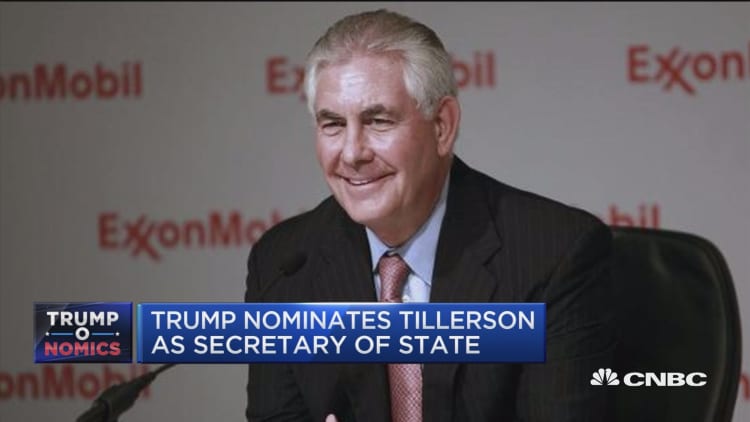Exxon Mobil stands to regain access to huge reserves of oil if the United States rolls back sanctions on Russia.
U.S. sanctions on Russia have prevented Exxon Mobil from exploring assets covering 63.6 million acres. The prospect of rapprochement between the U.S. and Russia remains speculative, but both President-elect Donald Trump and Russian President Vladimir Putin have said they want to improve relations. The two countries' relationship fell apart after Russia took Crimea from Ukraine in 2014 and then intervened in civil wars in Ukraine and Syria.
Trump over the weekend dismissed the assessment, reached unanimously by 17 U.S. intelligence services, that the Russian government directed cyberattacks on the United States in a bid to "interfere with the U.S. election process." He then waved off a subsequent report citing CIA sources that alleges that intervention was meant to boost his chances of beating Hillary Clinton in November.
On Tuesday, Trump announced he would nominate Exxon Mobil CEO Rex Tillerson as secretary of State.
Tillerson has experience negotiating deals in Russia, and he got to know Putin while chief executive of the world's biggest integrated oil and gas company.
Tillerson has the backing of former Republican Secretaries of State James Baker and Condoleezza Rice, but GOP lawmakers on the Senate Foreign Relations Committee, including John McCain and Marco Rubio, have expressed concerns about Tillerson's relationship with Putin.
Maximum loss from halted ventures: $1 billion
Tillerson has criticized U.S. sanctions on Russia and was awarded Russia's Order of Friendship by Putin in 2013. To be sure, as Exxon's chief executive, Tillerson's priority has been to his shareholders, and he has sought to protect the company's substantial interests in Russia.
Exxon's operations in Russia represent only a fraction of its global oil and gas production, but a joint venture with Russian state-controlled oil giant Rosneft to explore and produce fossil fuels in Arctic waters represents a big part of Exxon's potential future production growth.
Those endeavors have been on ice since 2014, when the United States imposed sanctions on Russia for its incursions into Ukraine. Exxon said in a filing after the sanctions were put in place that its "maximum before-tax exposure to loss from these joint ventures" totaled $1 billion through the end of 2015.
Exxon did not immediately respond to a CNBC request for comment.

Exxon and Rosneft entered the joint venture in 2012 to develop offshore reserves in the Arctic Kara Sea and the Black Sea, as well as onshore assets in Siberia. The following year, they advanced their strategic alliance by adding seven more blocks in the Chukchi, Laptev and Kara seas.
Exxon's holdings in Russia's Arctic waters and the Black Sea, which are not producing for the energy giant due to the sanctions, totaled 63.6 million acres. By comparison, Exxon holds 85,000 net acres across its main Russian venture, an offshore project called Sakhalin, which was in place before the sanctions.
Exxon holds a 33 percent stake in Arctic Kara Sea and Black Sea joint ventures, and a 30 percent stake in the Sakhalin project.
Rosneft estimates there are 87 billion barrels of oil lying in the three blocks of the Kara Sea covered by its joint venture with Exxon Mobil. The first exploration well in the Kara Sea in the icy Arctic waters above Russia yielded a discovery of 730 million barrels of oil, S&P Global Platts reported.

Just days before the Kara discovery was announced, the United States expanded sanctions on Russia's oil industry that forced Exxon Mobil to quickly wind down its operations in the Kara Sea.
Purely from a size perspective, the Arctic is one of Exxon's biggest prizes, said Anish Kapadia, an analyst at energy investment bank Tudor Pickering Holt. But he cautioned there are many questions about the economics of developing the reserves.
Drilling in the Arctic is notoriously difficult and can take place only during a few months of the year due to the harsh conditions. A number of oil companies have abandoned Arctic projects in the waters off Alaska.
From a financial perspective, Exxon's long-term plans in offshore Guyana make more sense than the Arctic joint venture, Kapadia said. Projects to develop liquefied natural gas and Canadian oil sands could also come with lower development costs.
"It's not just the size of the prize, it's whether you can make it work commercially," Kapadia told CNBC.
The onshore Siberian assets are not materially significant to Exxon's business, he added. That part of the joint venture likely benefits Rosneft by allowing it to tap Exxon's experience in extracting fossil fuels from tight rock formations, Kapadia explained.
Correction: This story was revised to correct the spelling of Condoleezza Rice's first name.


